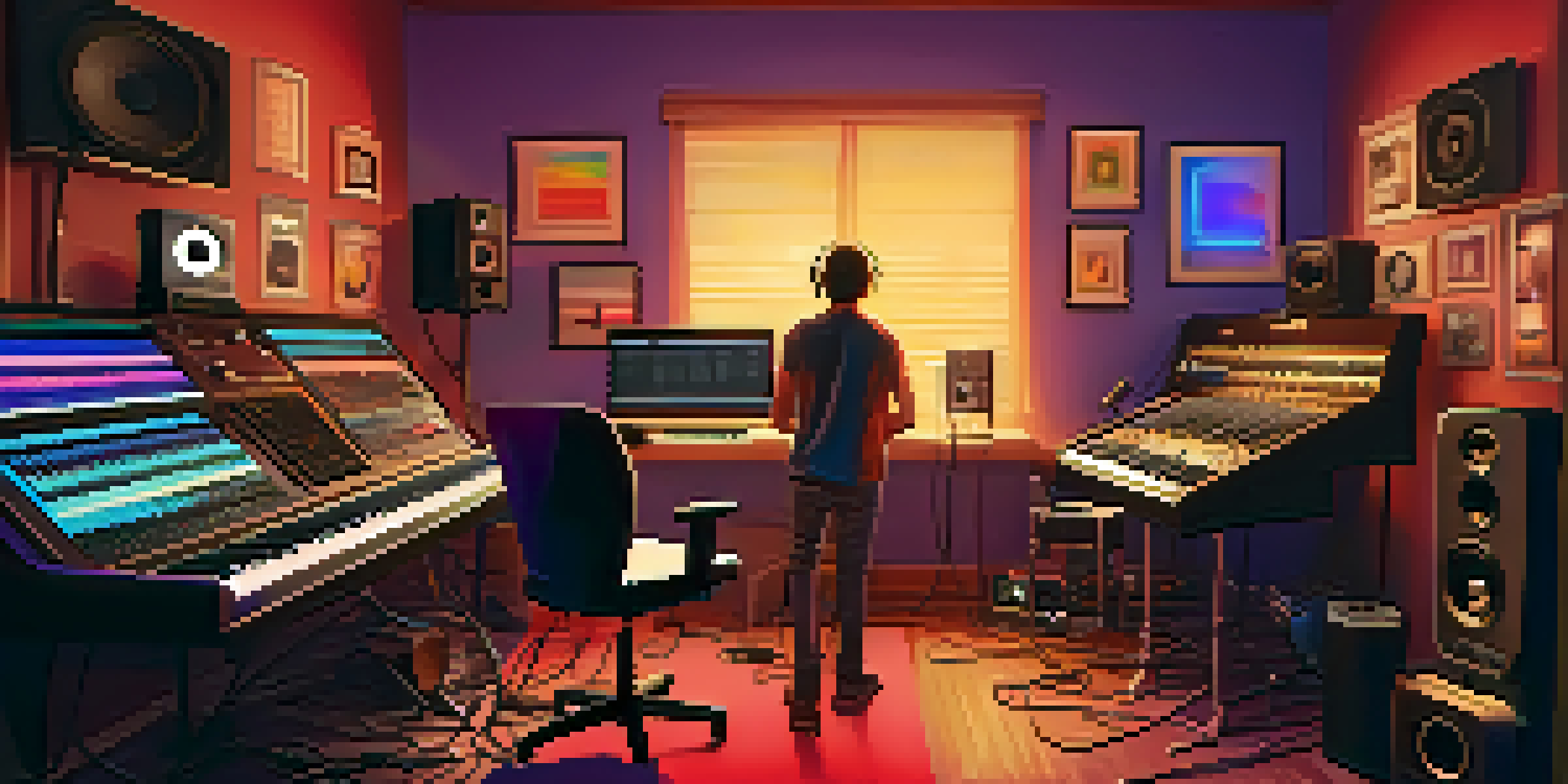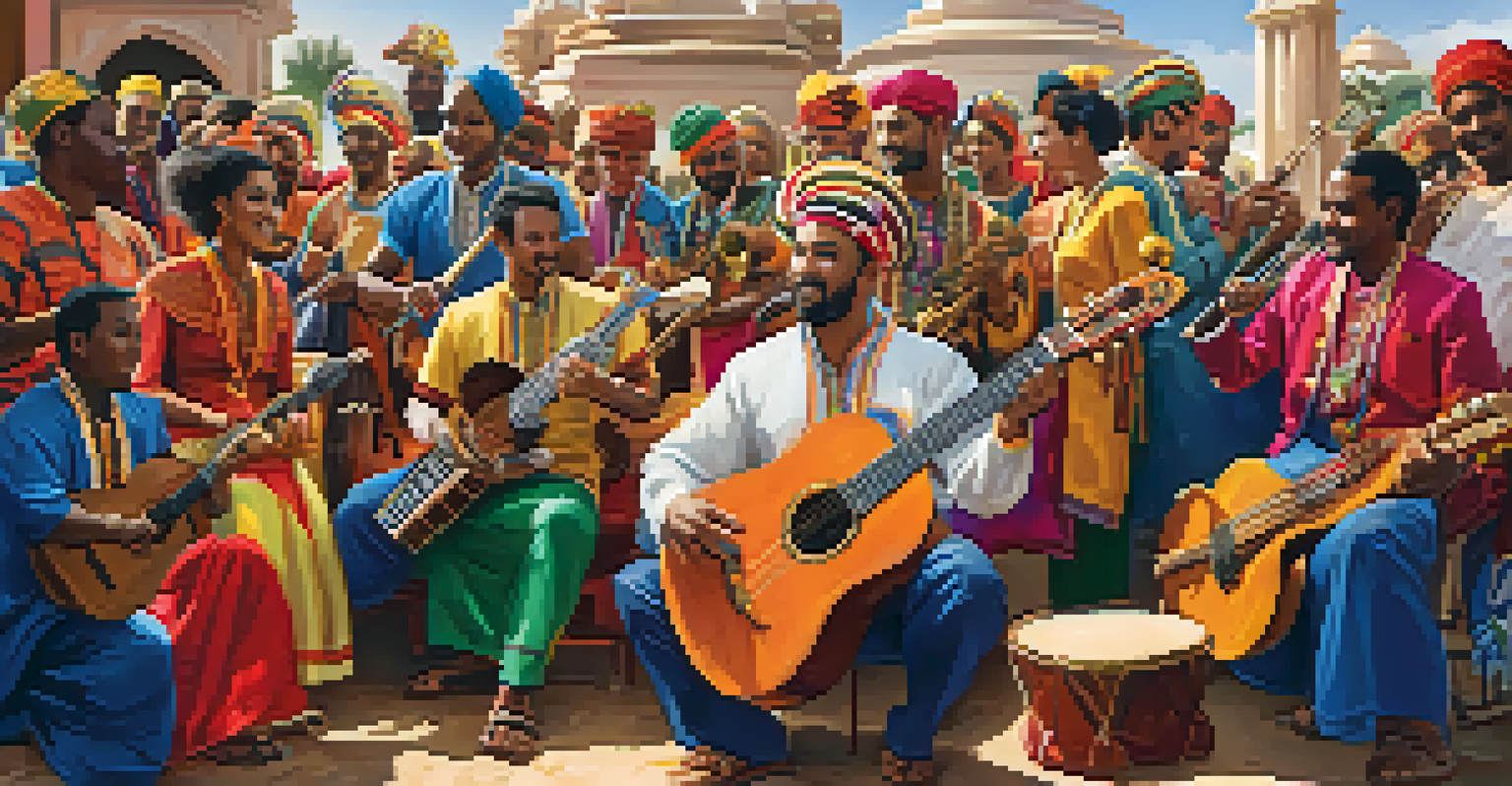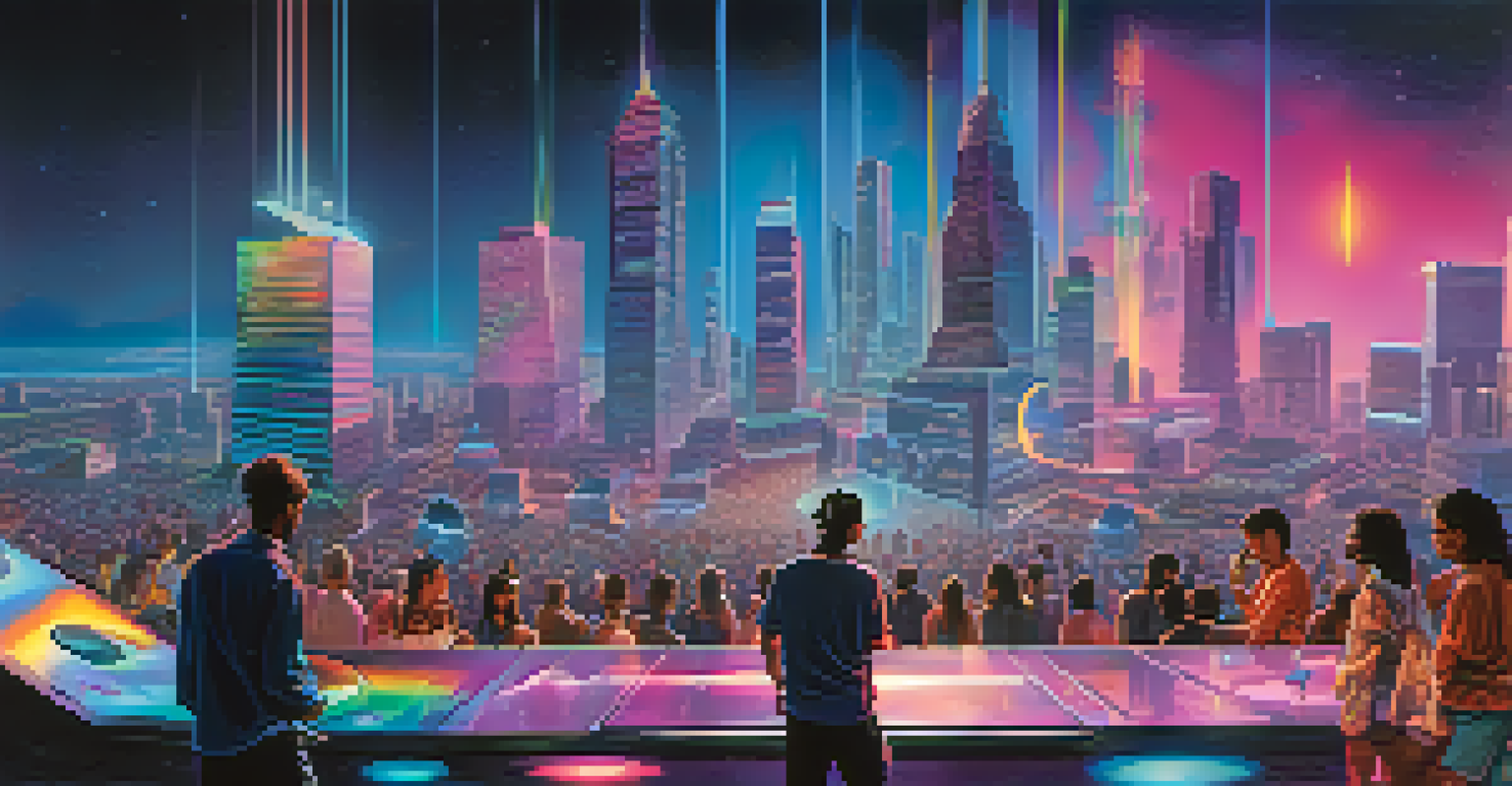The Effects of Digital Media on Music Genre Evolution

Understanding Digital Media's Role in Music
Digital media encompasses various platforms like streaming services, social media, and podcasts, all of which play a crucial role in how we consume music today. With the rise of platforms like Spotify and Apple Music, listeners can access an extensive library of genres at their fingertips. This accessibility has not only changed how we listen but also how artists create and share their music with the world, leading to an exciting evolution in genres.
Music is the shorthand of emotion.
Moreover, digital media fosters a sense of community among fans and artists, breaking geographical barriers. For instance, a musician from a small town can gain a global audience through platforms like YouTube and TikTok. These interactions often inspire genre-blending and collaboration, as artists experiment with sounds influenced by different cultures and styles, enriching the musical landscape.
In essence, digital media has democratized music, allowing diverse voices to emerge. This shift leads to a more vibrant, eclectic music scene, where traditional genres can evolve, merge, or even give birth to entirely new ones.
The Influence of Streaming Services on Genre Popularity
Streaming services have revolutionized how music is consumed, giving listeners the ability to discover and explore genres they may never have encountered otherwise. Algorithms curate personalized playlists, introducing users to emerging artists and niche genres, which can sometimes lead to unexpected viral hits. For example, the rise of lo-fi hip-hop has gained immense popularity mainly due to its presence on streaming platforms, demonstrating how user-driven content can propel a genre into the spotlight.

Additionally, the data collected from streaming platforms provides valuable insights into listener preferences, allowing artists and labels to adapt their music accordingly. Trends can change rapidly; a song that resonates well with listeners can quickly lead to a surge in similar sounds or styles. This constant feedback loop keeps artists on their toes and encourages them to innovate continuously.
Digital Media Transforms Music Access
Streaming services and social media have revolutionized how we discover, share, and experience music, fostering a vibrant and diverse musical landscape.
As a result, the popularity of genres can shift dramatically within a short period, creating a dynamic musical environment where adaptability is key. The impact of streaming services on genre popularity is undeniable, marking a significant change in how music is produced and consumed.
Social Media's Impact on Music Genre Evolution
Social media platforms like Instagram, TikTok, and Twitter have become vital tools for artists to promote their music and connect with fans. These platforms serve as stages for artists to showcase their work, leading to viral trends that can influence genre evolution. For example, TikTok has been instrumental in popularizing specific songs and genres, as users create dance challenges or lip-sync videos, bringing renewed attention to older tracks or emerging styles.
The future of music is not in the music itself, but in the way we consume it.
Moreover, social media allows for immediate feedback from fans, which can inform an artist's creative direction. This interaction can inspire artists to explore new sounds or themes, resulting in the blending of genres that reflects current cultural moments. The accessibility of these platforms means that diverse influences can be incorporated into mainstream music more quickly than ever before.
In this way, social media acts as both a promotional tool and a creative influence, driving the evolution of music genres in real-time. Artists can tap into trends and collaborate with others easily, leading to exciting new fusions and sounds.
The Role of Technology in Shaping Music Genres
Technology has always played a pivotal role in music, from the invention of the phonograph to the rise of digital audio workstations (DAWs). Today's artists have access to sophisticated software that allows them to create high-quality music from their homes, breaking down barriers to entry in the industry. This accessibility means that anyone with a passion for music can experiment, innovate, and contribute to genre evolution.
Moreover, technological advancements like virtual reality and augmented reality are beginning to redefine live music experiences. Artists can create immersive environments that enhance the listening experience, allowing for new genres that blend visual art with music. This integration of technology not only influences how music is experienced but also how genres are categorized and understood.
Globalization Blends Music Genres
The interconnectedness of cultures through digital platforms has led to the creation of hybrid genres, enriching the music scene with diverse influences.
As we continue to embrace new technologies, the potential for genre evolution is limitless. Artists can push creative boundaries, leading to a diverse array of sounds and styles that reflect the realities of our digital age.
Globalization and Its Influence on Music Genres
Globalization has significantly impacted music genres, allowing artists to blend sounds from various cultures and traditions. With digital media connecting people across the globe, influences from different regions can easily intermingle, leading to the creation of hybrid genres. For example, the fusion of reggaeton and pop has gained immense popularity, showcasing how cultural exchanges can lead to exciting new musical styles.
Additionally, international collaborations have become more commonplace, as artists from different countries work together to create music that resonates with diverse audiences. This trend not only enriches the music itself but also fosters a greater understanding of different cultures. The rise of platforms like Bandcamp enables artists to share their work with a global audience, facilitating these cross-cultural collaborations.
As a result, globalization has opened the door for a more inclusive music scene, where genres evolve through the sharing of cultural influences. This evolution reflects our interconnected world and highlights the importance of diversity in music.
The Evolution of Genre Definitions in the Digital Age
In the past, music genres were often rigidly defined, making it easy for listeners to categorize their favorite styles. However, the digital age has blurred these lines, giving rise to fluid genre definitions that adapt to current trends. This flexibility allows artists to draw inspiration from a range of influences, leading to the emergence of new genres that defy traditional categorization.
For instance, genres like 'trap' and 'emo rap' challenge the conventions of their predecessors, incorporating elements from hip-hop, rock, and electronic music. This blending of styles reflects the diverse tastes of today's listeners, who often enjoy a mix of genres rather than sticking to one. As a result, music is becoming increasingly eclectic, with artists freely experimenting and pushing the boundaries of what defines a genre.
Technology Redefines Music Creation
Advancements in technology empower artists to innovate and experiment with sounds, leading to new genres that reflect the realities of the digital age.
Ultimately, the evolution of genre definitions in the digital age encourages creativity and innovation. It empowers artists to break free from conventional constraints and explore new sounds, enriching the musical landscape for everyone.
The Future of Music Genres in a Digital World
As we look to the future, it's clear that digital media will continue to shape the evolution of music genres in profound ways. The ongoing advancements in technology and the increasing accessibility of music will likely lead to even more genre-blending and innovative sounds. Artists will continue to adapt to changing listener preferences, resulting in a dynamic musical landscape that reflects the complexities of contemporary life.
Moreover, as virtual reality and artificial intelligence become more integrated into the music industry, the possibilities for genre evolution are endless. Artists may find new ways to engage with their audiences and create immersive experiences that push the boundaries of traditional music formats. This will undoubtedly lead to the emergence of new genres that we can't yet imagine.

In conclusion, the future of music genres in a digital world is bright and full of potential. By embracing the changes that digital media brings, artists can continue to innovate and inspire, creating a rich tapestry of sounds that reflects our ever-evolving culture.